大学英语泛读课程Unit 5
- 格式:ppt
- 大小:926.00 KB
- 文档页数:28
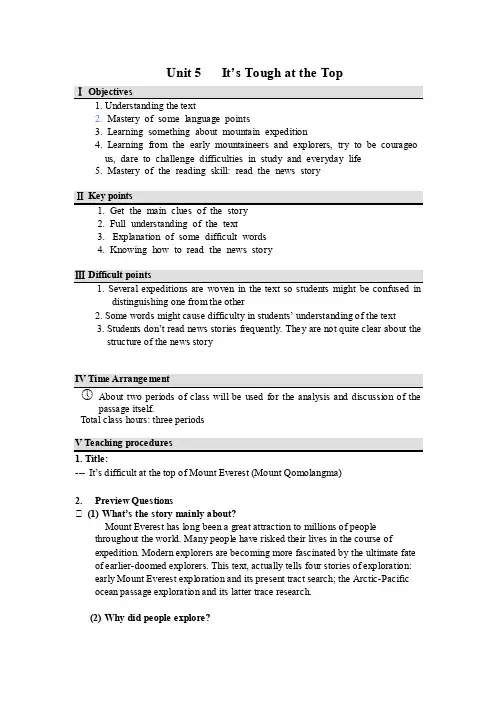
Unit 5 It’s Tough at the TopⅠ Objectives1. Understanding the text2. Mastery of some language points3. Learning something about mountain expedition4. Learning from the early mountaineers and explorers, try to be courageous, dare to challenge difficulties in study and everyday life5. Mastery of the reading skill: read the news storyⅡ Key points1.Get the main clues of the story2. Full understanding of the text3.Explanation of some difficult words4. Knowing how to read the news storydistinguishing one from the other2.Some words might cause difficulty in students’ understanding of the text3. Students don’t read news stories frequently. The y are not quite clear about thestructure of the news storyIV Time ArrangementAbout two periods of class will be used for the analysis and discussion of the passage itself.Total class hours: three periods1. Title:---It’s dif ficult at the top of Mount Everest (Mount Qomolangma)2. Preview Questions(1) What’s the story mainly about?Mount Everest has long been a great attraction to millions of peoplethroughout the world. Many people have risked their lives in the course ofexpedition. Modern explorers are becoming more fascinated by the ultimate fate of earlier-doomed explorers. This text, actually tells four stories of exploration: early Mount Everest exploration and its present tract search; the Arctic-Pacific ocean passage exploration and its latter trace research.(2) Why did people explore?The accomplishment of such a feat will elevate the human spirit and will give man, especially us geographers, a feeling that we are acquiring a true mastery of our surroundings.3. Text Analysis(1) Structure AnalysisHow many clues are interwoven in the text?clue 1: Mallory and Irvine (climber 1)clue 2: Simson’s team (climber 2)clue 3: Franklin’s group(explorer 1)clue 4: Beattie the anthologist (explorer 2)What’s their receptive goal? Did they achieve or not?GOAL Y ear ACHIEVE ? Climber 1 to reach the summit of Mount.Everest 1924 No Climber 2 to discover whether Climber 1 achieved 1999 Notheir goal before they died.Explorer 1 to find a new passage through 1845 Nothe Arctic into the PacificExplorer 2 to find out what happened to theill-fated Northwest Passage expedition 1981 Y es(2)More detailed information about the textPart I: Introduction: General remarks about why people have been attracted to climb Mount EverestPara.: 1-----Who was George Mallory?Why did he climb Mount Everest?How did he describe Mount Everest?Para 2.3-----Further explanation for people’s cl imbing the mountainWhy was the joint R.G.S. (The Royal Geographical Society 英国皇家地理学会)/Alpine Club set up?Part II: High Hopes1. Whose high hopes?2. What are their high hopes?3. What clues did they have?4.Whose body was it and how did they know it?5.What kind of man was Mallory?6. How about Mallory’s three expeditions?Part III Frozen to the Core1. Who were frozen to the core?2. What is the reason of Mallory and Irvine’s death? (two different opinions)3. What is the purpose of Torrington and Franklin’s expedition?4. What is the reason of Torrington and Franklin’s death? (two different opinions) Part IV. The Missing Link1. What does the missing link refer to?2. Did Simonson’s expedition team find anything? What are they?3. What did they want to find for their second expedition?4. Language points(1)Key W ords1. words on meaning of “search” in text:search; exploration; scour; discover; expedition2. phenomenal: extraordinary, unusual, spectacle.e.g. “As a climber, to know what Mallory did was phenomenal.”3. succumb to: die from4. piece together: assemble(2)Other important words and phrases1. treacherous – not to be relied upon 靠不住的2. margin –an amount allowed beyond what is needed, a limit in a conditionor process余地, 极限3. folly – foolish act4. altitude – height esp. above sea-level 高度(尤指)海拔5. feat – (1) sth. difficult well done, esp. sth. showing skill, strength, or daring技(武)艺(2) a notable act or deed, esp. an act of courage; an exploit 伟绩6. vintage – of a period in the past and having a reputation for high quality 因品质优良而著名之过去某一时期的7. slab – a broad, flat, thick piece 厚片8. gully –溪谷9. ledge - (悬崖)突出部分10. tattered – ragged11. intact – undamaged; complete12. legible – readable13. assault – attack14. prompt – arouse15. phenomenal – extraordinary16. tenacity – firmness17. reconnaissance – survey18. wane – decline19. buoy up – (fig.) keep up hopes保持希望; 振作; 鼓舞20. resourceful – good or quick at finding things机智的21. confide in – tell confidentially22. siege - 长期围攻23. repel – defeat24. fit – in good health25. bid – an attempt or effort to get, win or attack26. crag - A steeply projecting mass of rock forming part of a rugged cliff orheadland 峭壁27. ridge – long mountain range 山脊28. mosaic – complicated mixture of different parts .镶嵌, 镶嵌图案, 镶嵌工艺29. black and blue – bruise 撞(跌)伤, 伤痕30. gravel – small stones with coarse sand 碎石, 粗砂31. macabre – frightful32. permafrost – [地]永久冻土33. chart - To make a chart of; to plan (something) in detail 制图34. enigma – mystery35. mesmerize – fascinate36. succumb – vi. die from37. scurry – windy shower of snow 一阵风雪38. forensic – of, used in courts of law (用于)法庭的39. exhumation – taking out (a dead body) from the earth for examination掘尸检验40. autopsy – examination of dead bodies 验尸41. repeal – revoke, annul (a law)撤消, 废止(法律)42. preservation – condition of sth preserved43. patent - To invent, originate, or be the proprietor of (an idea, for example)取得...的专利权, 请准专利44. shred – tear into strip, piece, fragment45. contamination - the act or process of contaminating 污染;the state ofbeing contaminated被污染的状态;one that contaminates污染物46. gruesome - causing horror and repugnance; frightful and shocking: agruesome murder47. artifact – artificial product人工制品48. altimeter – barometer for showing height above sea-level 高度测量仪49. goggles –护目镜50. documentary – presenting facts with art 记录51. scenario - an outline or a model of an expected or a supposed sequenceof events 预料或期望的一系列事件的梗概或模式52. elusive – difficult to find, catch5. Figure of Speech(1) metaphorFor Mallory this was the opportunity of a lifetime. It was a challenge, but that only increase its appeal, for he o nce said “To refuse the adventure is to run therisk of drying up like a pea in its shell”.(2)simileBefore departing for the 1924 expedition Mallory had confided in a friend that it would be, “more of war than an adventure”.6. Summary of the whole text:It’s about some expeditions made by both early and modern mountaineers and explorers.Early expeditions:George Mallory and Andrew Irvine’s expedition for Mount Everest on 8 June 1924/ Torrington and Franklin’s expedition to chart the Northwest Passage on 19 May 1845.Modern expeditions:Eric Simonson and his team’s expedition for Mount Everest to discover whether or not Mallory and Irvine reached the top and how they died/ Owen Beattie’s four expeditions beginning in 1981 to find the eventual cause of the death of Torrington and Franklin’s men7. Questions for discussion:(1) Do you like exploring? Why?(2) Have you ever experienced an adventure? If yes, tell it to your classmates..(3) Shenzhou VI spaceship explored the outer space successfully and perfectly.What do you think of it?8.Exercises about the text9. Reading Skills: Read the News Story10. Fast Reading & ExercisesVI Homework.1. Home reading: Visions on Ice2.Preview Unit 6。

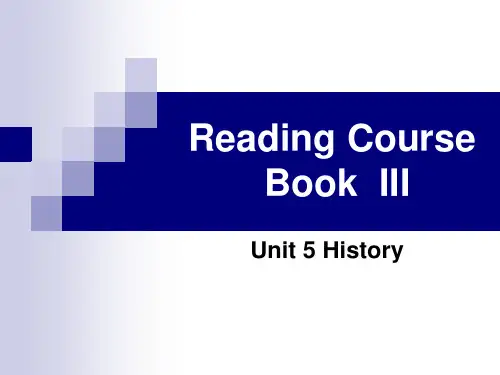

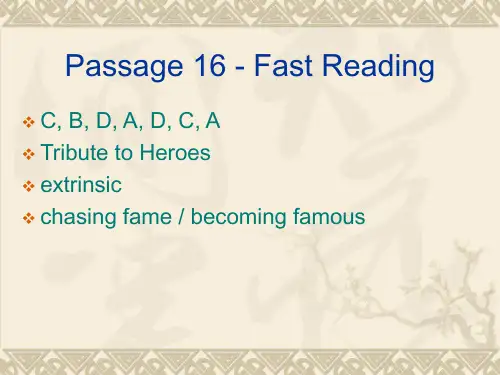
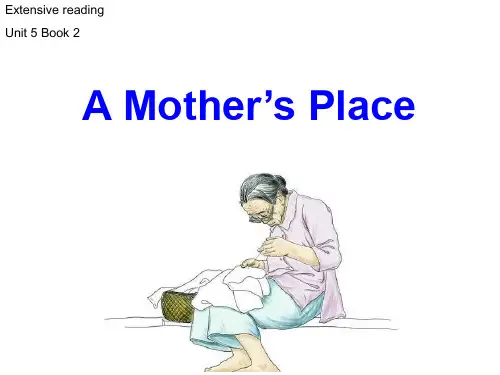
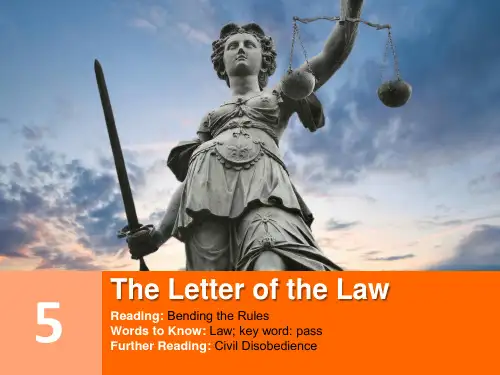
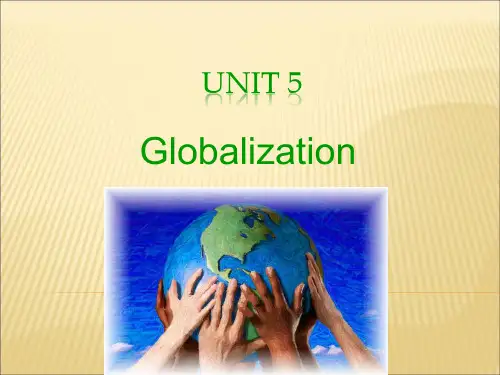



必修5Unit 5 First Aid 第六课时泛读课在我们的日常生活中,意外总是不期而至。
掌握急救知识,就如同拥有了一把在关键时刻能够拯救生命的钥匙。
今天,让我们走进必修5Unit 5 First Aid 的第六课时——泛读课,一起深入探索急救领域的更多奥秘。
首先,让我们来了解一下什么是泛读。
泛读,顾名思义,就是广泛地阅读,它与精读相对,侧重于获取信息的广度而非深度。
在这节泛读课中,我们将接触到更多丰富多样的急救案例和相关知识,从而拓宽我们对急救的整体认知。
当我们翻开课本,映入眼帘的是一个个生动的急救场景。
或许是在繁忙的街道上,有人突然遭遇交通事故;或许是在热闹的运动场上,运动员不慎受伤;又或许是在宁静的家中,老人突发疾病。
这些场景让我们真切地感受到急救的重要性和紧迫性。
通过泛读,我们会了解到不同类型的伤害以及相应的急救处理方法。
比如,烧伤是一种常见的意外伤害。
轻度烧伤时,我们要迅速用冷水冲洗受伤部位,以降低温度、减轻疼痛;而对于严重的烧伤,就不能随意处理,需要立即呼叫急救电话并等待专业人员的到来。
再比如,扭伤也是经常发生的情况。
在扭伤后的 24 小时内,应该进行冷敷,减少肿胀和疼痛;24 小时后,则可以改为热敷,促进血液循环和恢复。
除了常见的身体伤害,泛读课还会涉及到一些特殊情况的急救。
例如,中毒的急救处理。
如果是食物中毒,要尽快催吐,将未消化的食物排出体外;若是药物中毒,要保留药物包装,以便医生了解情况。
还有电击伤,遇到这种情况,首先要切断电源,然后对伤者进行心肺复苏,争取宝贵的抢救时间。
在泛读的过程中,我们还能学到一些急救的基本原则。
其中最重要的一点就是要保持冷静。
在紧急情况下,恐慌只会让情况变得更糟。
只有冷静下来,才能清晰地思考,做出正确的判断和行动。
另外,迅速采取行动也是关键。
时间就是生命,每一秒的延误都可能导致不可挽回的后果。
为了更好地理解和掌握这些知识,我们可以通过小组讨论的方式进行交流。
Unit 5 Business---- Levi Strauss& CompanyPart I Reading skill (15')Class relationshipfruit (A); pineapple, lemon, durian, sleeve, watermelon, pomegranate (B).In this class relationship, fruit is the higher-level term, we can also call it as hypernym in term of linguistics; while pineapple, lemon, durian, sleeve, watermelon, pomegranate are lower-level terms, or hyponym in term of linguistics. The higher- level term includes the lower-level term.Through this kind of relationship, we can guess some words' meaning by their class.. Johnson's paintings show his attention to geometric shapes of all kinds. The paintings contain circles, squares, triangle, pirrles, etc."Geometric ? (what's the common among the three words "circle, square, triangle") 几何的Pirrle ? At least, a kind of geometric shape.Contrast relationshipfllip seats available, so they had to buy expensive ones.With the knowledge of contrast relationship, we may speculate fllip is the antonym of expensive.In the sentences containing contrast relationship, the following words are often used: unlike, however, while, nevertheless, despite, although, even though, and on the other hand.Before you read:1.Have you ever bought any clothing in the trademark “Levi’s”?What’s the style ofthe “Levi’s” clothing? Do you like it? Why, or why not? (fashionable, attractive,cool , tight, shapeful , confident,)2.What are the essential factors that lead to the success of Levi Strauss &Company?3.Why do many people go into business for themselves rather than work for analready existing organization? What’s the attraction? What are some of the qualities do you think they should have?About the text:1.What’s the main idea? (It mainly deals with the historical development ofLevi’s company.)2.What’s the organization pattern of the text? ( time sequence /chronological)3.What does “dry goods” mean in Para.1, line 3?4.What’s the company’s famous logo? (Para.3, line 2)5.Paraphrase the sentence “The company has operated in an enlightenedmanner.” in Para. 4, line 1? (= flexible, creative)6.According to the text, what make Levi Strauss successful? (He is good atdiscovering the need of market and adjusting to the changes. )7.Why did Levi’s jeans have to be rationed? Why were Levi’s jeans sold onlyto people doing defense work? What’s the function of this detail? (to emphasize the degree of its popularity/success)Critical thinking:1.Will you try to go into business for yourselves? Why, or Why not?2.Will you buy commodity in limited production? (限量版)Why?3.Do you want to be a leader in a small company or to be an employee in awell-established company?Homework:Choose one question above to write a short essay.。